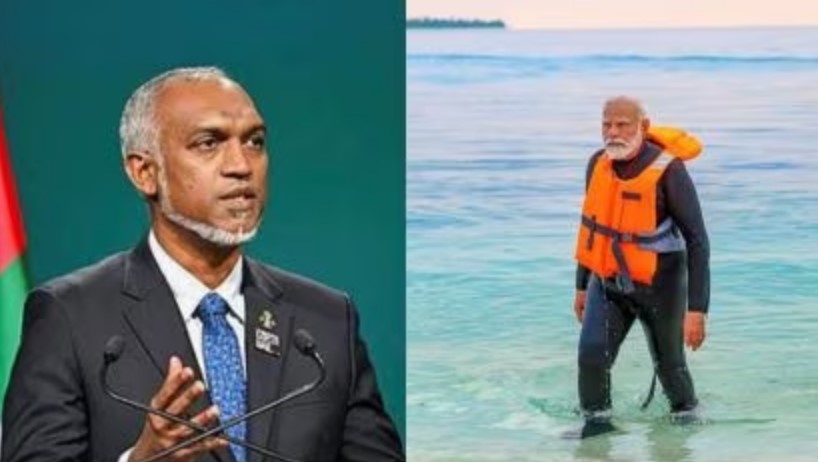A social media clash involving derogatory tweets against Indian PM Modi has escalated into a tourism conflict between India and the Maldives. The episode highlights the inflammatory power of digital nationalism.
Reason for the India-Maldives controversy began
The conflict was sparked after Modi visited the Lakshadweep islands and promoted them as an alternative holiday spot to the Maldives. In response, Maldivian minister Mariyam Shiuna ridiculed Modi as a “clown” and “terrorist puppet” in tweets. Minister Zahid Rameez also questioned India’s ability to compete with the Maldives in tweets.
These remarks provoked outrage on Indian social media. Celebrities like Akshay Kumar slammed the comments as “hateful and racist” and kickstarted a #BoycottMaldives campaign that gained steam as more influencers joined. Prominent figures, from Bollywood actors to cricket players, also urged fans to turn to local destinations instead, with another hashtag #ChaloLakshadweep – meaning “Let’s go to Lakshadweep,” where Modi visited – gaining traction.
Conflict between India and Maldives:
- Started when Indian PM Modi visited Lakshadweep islands and promoted them as an alternative to Maldives
- Maldivian ministers criticized Modi’s tourism promotion, accusing India of targeting Maldives
- Indian celebrities and officials called for boycotting Maldives in response to ministers’ remarks
- India summoned a Maldivian envoy, dispute escalated into a diplomatic tussle
- Maldives suspended ministers who disparaged Modi but tensions continued
- Raises concerns about economic impact, as Indian tourists vital for Maldives
- Previously friendly ties strained amid calls for boycotts on both sides
- Social media controversy overturned diplomatic interests between the nations
In short, the conflict arose from tourism promotion remarks and escalated via social media, straining relations between the historically close nations.
Which Action Did India Take Against Maldives
As the boycott campaign spread virally online, India took action. It summoned the Maldivian ambassador to condemn the derogatory tweets. Major Indian travel companies like MakeMyTrip suspended bookings to the Maldives in solidarity.
Meanwhile, the Maldives quickly suspended the ministers behind the inflammatory tweets targeting Modi. However, it failed to contain the boycott movement surging on social media.
Tourism Industries in Both Nations Rattled
The digital war has created uncertainty in the critical tourism sector in both countries. Indians comprise over 10% of visitors to the Maldives annually. If the boycott call is heeded, it could substantially impact the island nation’s economy.
Conversely, the spat has accelerated interest in exploring Lakshadweep as an alternative destination. However, its limited tourism infrastructure may be overwhelmed by mass tourism. Environmental concerns have also emerged.
Indian tourists made more than 209,000 trips to Maldives in 2023, making up 11% of its tourism market, statistics released last week show. Russia contributed about the same amount, and China wasn’t far behind, providing 187,118 visits, or 10% of the total.
But the officials’ remarks angered some Indian holidaymakers, who posted screenshots on social media to show they had canceled their trips to the island chain under the hashtag #BoycottMaldives.
Origins of the Dispute
Maldivian Ministers’ Controversial Tweets
The spat originated from tweets by Tourism Minister Abdulla Mahzoom Majid and MP Mariyam Shiuna, questioning Modi’s promotion of Lakshadweep as an alternative to the Maldives. Shiuna’s tweet mocking Modi as a “clown” sparked initial backlash.
In a post on X, Maldives Foreign Minister Moosa Zameer called the officials’ remarks “unacceptable,” adding that the archipelago is committed to “fostering a positive and constructive dialogue with our partners.”
A source told CNN on Monday that the Indian High Commission in Maldives had “strongly raised and expressed concerns” to the Maldivian Foreign Office.
Also Read : Mohammed Shami Receives Arjuna Award for Bowling Exploits
Maldivian Politician’s Inflammatory Remark
A controversial tweet by politician Zahid Rameez poured fuel on the fire. He questioned India’s ability to match the Maldives in cleanliness and service standards. This remark catalyzed the boycott calls against the Maldives.
Targeted Tweets Against PM Modi
The ministers behind the tweets — Mariyam Shiuna and Abdulla Mahzoom Majid — directly targeted PM Modi in their posts. Their attacks on the Indian leader are seen as a trigger for the escalating tensions between the countries. Three Maldives officials responded to his post, describing Modi as a “clown,” “terrorist” and a “puppet of Israel,” according to Reuters.
Conclusion
The social media-driven tourism conflict between India and the Maldives underscores the disruptive power of digital nationalism unconstrained by diplomatic wisdom. It serves as a cautionary tale of how economic interdependence can be jeopardized when nationalist passions get aroused online. As old friends, both nations now need to exercise restraint and dialog to resolve the dispute.
.

